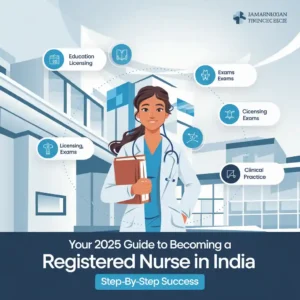Global standards of healthcare have put a pressing demand on India’s nursing sector and will require 4.7 million nurses by 2024 (NITI Aayog). But this raises the question, how do you become a part of this rewarding career? Whether you are a teacher or professional seeking a career change, this segment explicates the steps on how to become a registered nurse.
Thank you for reading this post, don't forget to subscribe!
What Exactly is a Registered Nurse?
An individual who is privileged to practice from a legal standpoint is termed to be a Registered Nurse (RN). These professionals are responsible for medication management, patient care, and allocation of duties of the healthcare aids. RNs typically possess a baccalaureate of science in nursing, while holders of diplomas in midwifery such as an ANM and GNM are not designated with this title. RNs are qualified to undertake managerial roles in university education, research, and hospitals.


Reasons why one should pursue Nursing
- RNs are in High Demand: India currently suffers from a 70% deficit of nurses, especially in rural territories.
- High Earning Potential: The opportunity for Nurses from India is very lucrative in areas such as the US, UK, and UAE.
- Less Stress: The field of healthcare is constant, which in turn provides job stability in nursing.
📚 Section 1: Eligibility Criteria for Nursing Practice in India
1.1 Academic Credentials
To get registered, a candidate must possess one of the following academic credentials:
ANM – Auxiliary Nurse Midwifery:
- Length: 2 years.
- Admission eligibility: 10th class with at least 40% marks.
- Main emphasis: Rural healthcare and midwifery.
- GNM – General Nursing and Midwifery:
- Length: 3.5 years (Having 6 months of internship).
- Admission eligibility: 12th class with 50% and above in PCB.
- B.Sc. Nursing:
- Length: 4 years.
- Admission eligibility: 12th class with 55% and above in PCB and English.
1.2 Age Limits
- None below 17 years (ANM/GNM) or 18 years (B.Sc Nursing).
- Age limit varies for states but is generally set at 35 years for kerala GNM courses.
1.3 Health Requirements
- Medical certificate (the applicant must not have chronic diseases).
- The applicant must not have any health issues that prevent him/her from providing nursing care.
👣 Section 2: 5 Steps to Become a Registered Nurse in India
2.1 The First Step is to Choose the Nursing Course that is Right for you
- ANM: The fastest way to get into rural healthcare (approximate fee: ₹30,000 – ₹50,000).
- GNM: A course that equally emphasises theoretical and practical components (approximate fee: 1 – 2 lakhs).
- B.Sc Nursing: Preferred for managerial positions and international jobs (approximate fee: 2 – 5 lakhs).
Top Nursing Institutions:
- AIIMS Delhi (B.Sc Nursing)| CMC Vellore | Rajkumari Amrit Kaur College, Delhi.
2.2 Step two – Pass the entrance Exam.
- NEET UG: Exam is required for those wishing to undertake B.Sc Nursing in Government colleges (2023 cutoff is 137/720 for general category).
- AIIMS Nursing Entrance Exam: Focuses on Biology and General Knowledge.
- State Exams: Kerala KEAM Nursing | West Bengal JENPAUH | Tamil Nadu ANM / GNM Entrance.
Helpful Tip: Use “Nursing Entrance Exam Guide” by Arihant to pass with a score above 90percent.
2.3 Step 3 – Complete the Nursing Program.
- Subjects Covered: Anatomy, Pharmacology, Community Health Nursing, and over 1000 hours of clinical training.
- Internship – 6 – 12 months in hospitals like Apollo or Fortis.
Master the following skill: Effective communication with patients and competent responses to emergencies.
The process for registration involves submission of specific documents, in this case, marksheets, ID proof, and internship certificate. A payment of ₹1000 is also necessary. It is important to note that practicing self registrations or licenses isn’t an option as it would be a direct violation of the Indian Nursing Act. The term of this license validity is 5 years in total and would need to be renewed thereafter.
Nursing expert and HospitalCareer are examples of job portals that would ease the transition into the nursing career as well as find appropriate entry level positions in the field. There’s a variety of private and public organizations such as AIIMS, ESIC, Max Healthcare, and Manipal that bring in a starting salary of 18,000 rupees and going all the way up to 30,000.
ICU registered nurses earn over 50,000 in metro cities whereas jobs with top hospitals that deal with children in geriatric care are in huge demand because of the increasing population in India. Advanced certifications such as ACLS and PALS further increase this month salary in the range of 10,000 to 15,000.
India offers government nurses a salary between 25 to 50 thousand and with the added benefit of additional pensions. For populace residing abroad or in the US, this pays between 6 to 10 lakhs, whereas in the Gulf country they offer 1.5 to 3 lakhs tax free.
Burnout and emotional exhaustion after long 12 hour shifts is a common challenge faced but can be managed by mindfulness techniques and sleep prioritization.
- Adjust: Attend groups that will help you such as TNAI (Trained Nurses Association of India).
Insider Hint: Familiarize yourself with the hospital’s technology such as electronic health record systems!
❓ FAQS
Q1: Is it possible to pursue nursing without coming from a NEET background?
Yes, these particular courses do not mandate NEET. It is only for B.Sc. nursing students from government colleges that they need it.
Q2: Is B.Sc Nursing preferable over GNM?
Yes. Especially in leadership positions, where they earn more, and in those who wish to study abroad.
Q3: What is the procedure to work as a nurse in USA?
Pass NCLEX and CGFNS exams and then secure a US visa.
🏁 Conclusion: Start Your Nursing Career Here With Us!
Nursing has never been as fulfilling, with India’s healthcare sector at its most developed. From deciding the perfect course to acing your target job, registered nursing is as passionate as it is a matter of unconditional determination. So, get that nursing cap on and let’s go!


